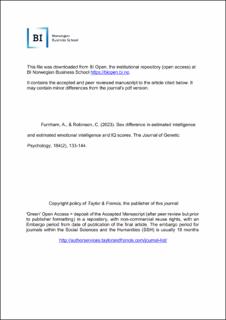| dc.contributor.author | Furnham, Adrian | |
| dc.contributor.author | Robinson, Charlotte | |
| dc.date.accessioned | 2023-08-24T11:35:35Z | |
| dc.date.available | 2023-08-24T11:35:35Z | |
| dc.date.created | 2022-12-14T11:22:37Z | |
| dc.date.issued | 2022 | |
| dc.identifier.citation | The Journal of Genetic Psychology. 2022, . | en_US |
| dc.identifier.issn | 0022-1325 | |
| dc.identifier.uri | https://hdl.handle.net/11250/3085632 | |
| dc.description.abstract | In five different online studies of community samples, participants (N > 2,200) estimated their IQ and EQ on a single scale and completed three different, short, untimed intelligence tests. In all studies, women estimated their IQ significantly lower than men (effect sizes from 0.22–0.47) and estimated their EQ higher (effect size 0.04–0.32). In only one study were there actual sex differences in IQ test scores. All correlations between the two estimates were significant and positive, and ranged from .37 < r < .47. The robustness of the IQ-EQ hubris-humility effect across measures and populations is discussed. Limitations are acknowledged, particularly in the use of tests. | en_US |
| dc.language.iso | eng | en_US |
| dc.publisher | Taylor & Francis | en_US |
| dc.rights | Navngivelse-Ikkekommersiell 4.0 Internasjonal | * |
| dc.rights.uri | http://creativecommons.org/licenses/by-nc/4.0/deed.no | * |
| dc.subject | Intelligence | en_US |
| dc.subject | IQ | en_US |
| dc.subject | EQ | en_US |
| dc.subject | Self-estimates | en_US |
| dc.subject | sex differences | en_US |
| dc.title | Sex Difference in Estimated Intelligence and Estimated Emotional Intelligence and IQ Scores | en_US |
| dc.title.alternative | Sex Difference in Estimated Intelligence and Estimated Emotional Intelligence and IQ Scores | en_US |
| dc.type | Peer reviewed | en_US |
| dc.type | Journal article | en_US |
| dc.description.version | acceptedVersion | en_US |
| dc.rights.holder | Taylor & Francis Online | en_US |
| dc.source.pagenumber | 12 | en_US |
| dc.source.volume | 184 | en_US |
| dc.source.journal | The Journal of Genetic Psychology | en_US |
| dc.source.issue | 2 | en_US |
| dc.identifier.doi | 10.1080/00221325.2022.2140025 | |
| dc.identifier.cristin | 2092988 | |
| cristin.ispublished | true | |
| cristin.fulltext | postprint | |
| cristin.qualitycode | 1 | |

